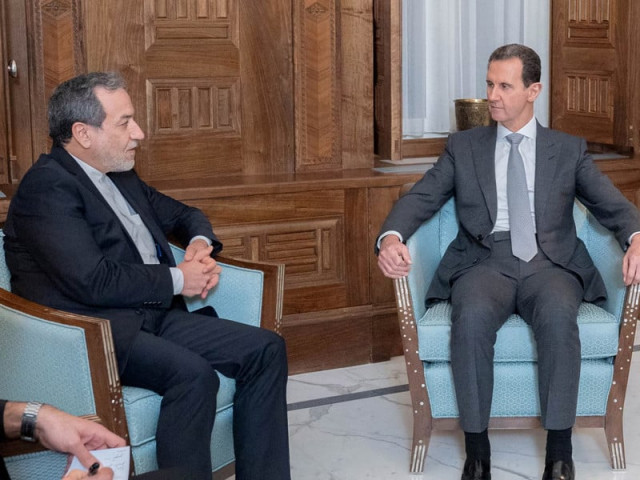US, UAE discussed lifting Assad sanctions
'Carrot-and-stick' approach aims to fracture Syria alliance with Iran

The US and the United Arab Emirates have discussed with each other the possibility of lifting sanctions on Syrian President Bashar
al-Assad if he peels himself away from Iran and cuts off weapons routes to Hezbollah, five people familiar with the matter said.
The conversations intensified in recent months, the sources said, driven by the possible expiry on Dec 20 of sweeping US sanctions on Syria and by Israel's campaign against Tehran's regional network, including Hezbollah in Lebanon, Hamas in Gaza and Iranian assets in Syria. The discussions took place before anti-Assad rebels swept into Aleppo last week in their biggest offensive in Syria for years.
According to the sources, the new rebel advance is a signal of precisely the sort of weakness in Assad's alliance with Iran that the Emirati and US initiative aims to exploit. But if Assad embraces Iranian help for a counteroffensive, that could also complicate efforts to drive a wedge between them, the sources said.
Iran's foreign minister Abbas Araqchi visited Syria on Sunday in a show of support for Assad, and UAE President Sheikh Mohamed bin Zayed Al Nahyan spoke to Assad by phone about latest developments at the weekend.
For this story, Reuters spoke to two US sources, four Syrian and Lebanese interlocutors and two foreign diplomats who said the US and UAE see a window to drive a wedge between Assad and Iran, which helped him recapture swathes of his country during the civil war that erupted in 2011.
Lebanese media have reported that Israel had suggested lifting US sanctions on Syria. But the UAE initiative with the US has not previously been reported. All of the sources spoke on condition of anonymity to discuss the back-room diplomacy. Syria's government and the White House did not respond to questions from Reuters. The UAE referred Reuters to its statement on bin Zayed's call with Assad.
The UAE has taken a leading role in rehabilitating Assad among the mainly Arab states that shunned him after he accepted help from Iran to put down the rebellion against him. The Emirates hosted Assad in 2022, his first visit to an Arab country since the start of the war, before the Arab League reinstated Syria's membership. The UAE has long hoped to distance Assad from Iran and wants to build business ties with Syria, but US sanctions have hampered those efforts, the sources said.
A senior regional diplomat briefed by Tehran told Reuters Iran had been informed "about behind-the-scenes efforts by some Arab countries to isolate Iran... by distancing Syria from Tehran". The diplomat said those efforts were linked to offers of possible sanctions relief by Washington.
'Carrot and stick'
Hezbollah and its patron Iran have intervened in Syria since 2012 to protect Assad against rebels - but their bases and weapons shipments through Syria have been repeatedly hit by Israel, which has sought to weaken Iran across the region.
In recent months, Hezbollah withdrew fighters from Syria, including the north, to focus on battling Israel in southern Lebanon.
The rebels who swept this week into Aleppo pointed to the Hezbollah withdrawal as one of the reasons why they faced little resistance from government forces. A US source familiar with the matter said White House officials discussed an overture with Emirati officials, citing the UAE's interest in financing Syria's reconstruction and Assad's "weakened position" after Israel's offensive against Hezbollah.
The possibility of sanctions relief for Assad, while Israel was hitting Iran's allies, created an "opportunity" to apply a "carrot-and-stick approach" to fracture Syria's alliance with Iran and Hezbollah, the US source said.
Sanctions relief
The US placed sanctions on Syria after Assad cracked down against protests against him in 2011, and the sanctions were repeatedly tightened in the years of war that followed.
The toughest, known as the Caesar Act, passed Congress in 2019. The Caesar sanctions apply across Syrian business sectors, to anyone dealing with Syria regardless of nationality and to those dealing with Russian and Iranian entities in Syria.
Assad said they amounted to economic warfare, blaming them for the Syrian currency's collapse and drop in living standards. The sanctions will "sunset" - or expire - on Dec 20 unless renewed by US lawmakers. Part of the recent American-Emirati discussions centered on allowing Caesar sanctions to expire without renewal, said the US source and three of the Syrian interlocutors.
One Syrian interlocutor said the UAE had raised letting them expire with White House officials two months ago, after having unsuccessfully pushed for at least two years of sanctions relief for Assad after a deadly earthquake in Feb 2023.
Mohammad Alaa Ghanem, a Syrian activist in Washington, DC with the Citizens for a Secure and Safe America, told Reuters his group had been working to extend the Caesar sanctions and assessed they had bipartisan support to do so. "We've been in talks over this for the past couple of months, although of course no political outcome in a town like Washington can be guaranteed 100%," he said.



















COMMENTS
Comments are moderated and generally will be posted if they are on-topic and not abusive.
For more information, please see our Comments FAQ